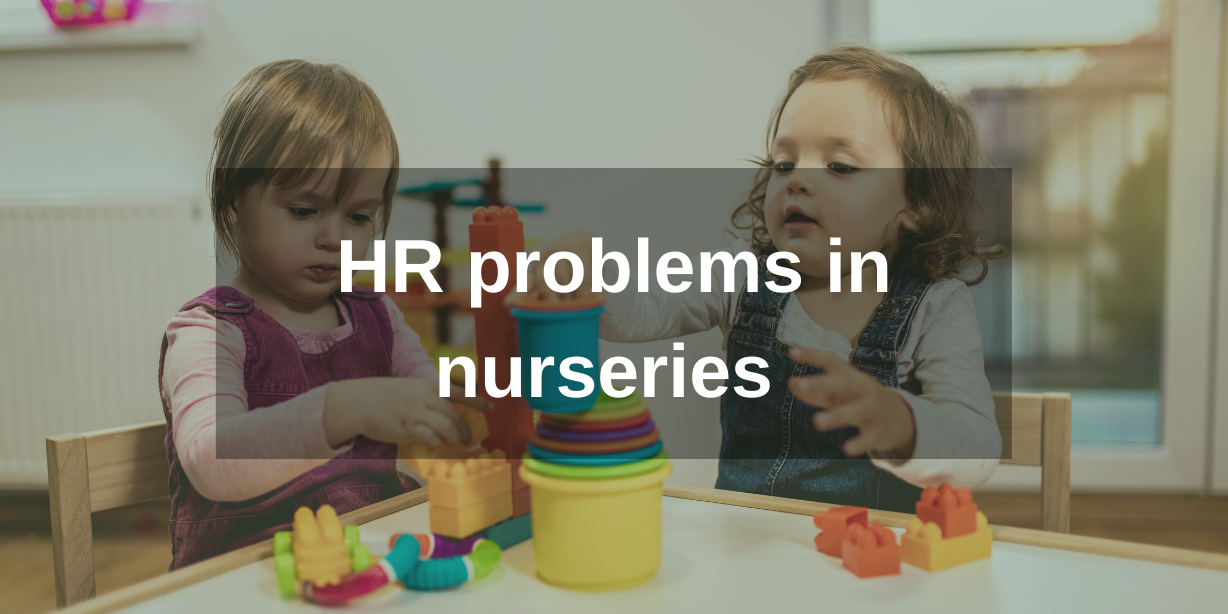HR problems in nurseries
Employing staff in the Early Years Sector comes with a raft of its own unique HR problems. As we slowly ease ourselves out of the pandemic, Nurseries and other Early Years Settings are facing new challenges – rising vacancies, a shortage of qualified staff, and a marked increase in staff burnout compound already existing HR headaches such as staff pregnancies and term-time only workers.
Read on to find out more about the biggest HR problems in Nurseries and our top tips for resolving them.
We provide HR and employment law support and advice to businesses in education
Staff Shortages
It is no secret that businesses across the UK are finding staffing difficult as we come out of the pandemic and through the Great Resignation. Early years settings are facing some of the greatest challenges in this area, however. A recent survey by the Early Years Alliance reports that 8 in 10 settings are finding it difficult to recruit staff. Half have had to limit the number of children they support or stop taking new children altogether. Moreover, one in six settings believes that staffing shortages are likely to force their setting to close permanently within a year.
Many businesses are finding themselves asking how they can improve staff retention to prevent the need to recruit. Others are asking how they can make their business attractive to prospective hires and build loyalty within the team?

Pay is not the be-all-end-all of the employment package. Additional holidays, gym memberships, childcare benefits or vouchers, and clear pathways to career progression all serve to improve staff retention and attract the right candidates to your vacancies. Early Years Settings are often blessed with staff that have a real passion for the work they do – encourage that passion by rewarding staff for their work. It is not always about the paycheque!
Burn Out
Burnout is a state of physical, emotional, and mental exhaustion caused by excessive and prolonged stress – particularly within the workplace. Employee Burnout can lead to a number of problems in the workplace – reductions in productivity, motivation, and job satisfaction to name a few.
The number of burned-out employees is reaching new highs in the wake of the pandemic. Early years providers have been a vital lifeline to parents during an extremely challenging period, and this has undoubtedly had a knock-on effect on staff.

Mental ill-health should be a concern at the forefront of your mind, especially in settings where you rely on your staff to create loving and educational atmospheres for children at impressionable ages. In this, it is always better to identify any potential issues you may have early – working with your staff against burnout can reduce the risk of stress and depression and can reduce your levels of absenteeism.
Employment Law Solutions burnout guide can help you identify and manage early signs of some mental ill-health.
Remember that employees should not suffer a detriment because of their mental ill-health, and this can range from simply being treated less favourably to dismissal. When considering how to deal with employees with poor mental health you should always take advice on your obligations to your staff, and how to navigate this area to reach your business goals.

Staff pregnancies
Pregnant staff should be treated with great care. With 96% of Early Years staff being women, staff sharing a passion for caring for and working with children, and the Early Years Settings often offering childcare incentives, it should be no surprise that staff pregnancies are a major HR challenge for Nurseries and other settings.
As well as risk assessing the work that pregnant staff does, employers must also ensure they do not discriminate against pregnant staff or staff on maternity.
The legal definition of discrimination is much different for pregnant staff or staff on maternity leave than for other protected characteristics. Employers need to ensure that they treat do not treat staff unfavourably due to their pregnancy or maternity – a much lower bar for discrimination that the less favourable treatment for, say, disability. This could mean that even throwing a Christmas party while an employee is on maternity – and not inviting them – could give rise to a costly claim for discrimination.
This means that navigating HR issues with pregnant staff or staff on maternity can be risky. However, do not fear – Employment Law Solutions are highly experienced in helping businesses like yours sail seamlessly through these complex HR issues and towards their business goals. Always take advice if you need to deal with a pregnant member of staff or one on maternity.
Term-time working
As a Nursery or other Early Years setting, you may well have staff that works for you on a term-time basis. However, this comes with its own challenges and HR headaches.
Firstly, it is imperative that your term-time contracts contain the proper clauses to ensure that they are suitable for term-time work. It is not simply enough to edit the times of work to only be during term time – you must also ensure you properly draft your annual leave clauses correctly, among other clauses.
Additionally, if you also employ full-time staff, term time workers are classed as part-time. This means that they are protected by the Prevention of Less Favourable Treatment (Part-Time Worker) Regulations. Part-time workers should not be subject to a detriment because of their part-time nature, and this can include contractual entitlements such as annual leave. Ensure you properly pro-rata annual leave entitlement for part-time workers in order to avoid potential claims.
You should always ensure that your contracts are water-tight. Employment Law Solutions can help, and can give your contracts a free, no obligation review to identify any potential issues they have that could cause you headaches in the future.
Training
We understand that it is imperative that you train your staff to a high standard so that they can provide the best support for the children you look after. However, organising training in such a busy sector can cause many headaches. This includes both on-the-job training and online training.
It can often be difficult to find time in a busy working day to train staff online. This often leads to questions on whether staff can train at home, and whether or not they should be paid for it. The answers to these questions are found in the contract. Training for the job will ordinarily be paid working time, even if it is done at home and online. However, a clause in the contract stipulating that online training is to be completed at home without pay would allow you to more freely assign training time to staff without straining your budget.

A properly drafted contract can be more helpful than you might think. With staff retention being such an issue in the sector, it can often be difficult to justify spending money on training courses for staff when there are high levels of turnover. However, a proper training clause in your contract will allow you to claw back costs of training for staff who leave you within specified periods following training. This can give you the confidence to fully train staff for their roles as quickly as possible.
Employment Law Solutions offer The Training Solution, business training for all sectors, covering a wide range of topics. Find out more.
“We very much consider them now part of our team having them on board has freed us up to focus on other areas of the business and we let them look after our HR issues.”
Let us help cure your HR Headaches
Speak to Employment Law Solutions if you have any queries about your current contract, or if you wish to make changes to your current contracts. A dedicated lawyer would love to review your current documentation for you, free of charge.
Employment Law Solutions have a solid base of Nurseries and early years settings within our client base and are in touch with the issues and HR headaches that you may be facing. We can help. Call us today or get in contact by email for a free consultation on the issues you may be facing in your early year’s settings.
Call us on 01270 781 006





